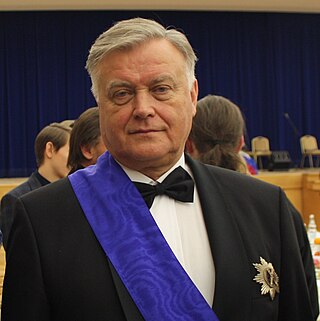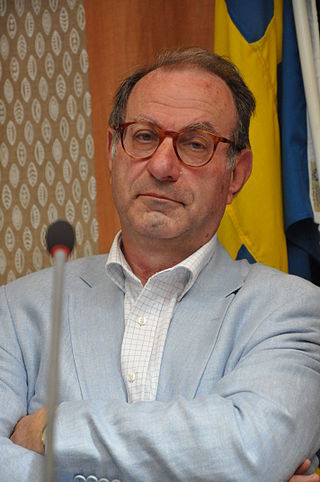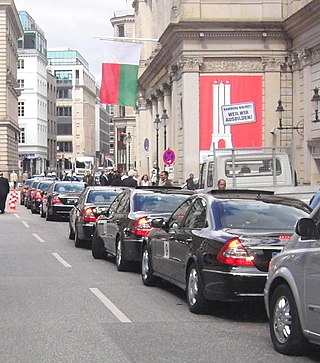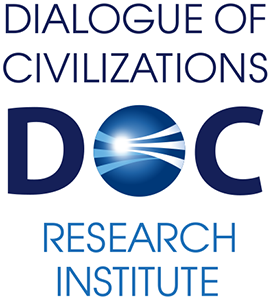
Walter Schwimmer (born 16 June 1942) is a former politician and diplomat from Austria. Was Secretary General of the Council of Europe from September 1, 1999, to August 31, 2004.

Walter Schwimmer (born 16 June 1942) is a former politician and diplomat from Austria. Was Secretary General of the Council of Europe from September 1, 1999, to August 31, 2004.
After being a member of the Austrian Parliament (National Council) for 28 years, serving as chairperson of several committees (Justice, Health, Housing and Construction) and deputy leader of his political group (ÖVP – Austrian People's Party), he was elected Secretary General of the Council of Europe.
Schwimmer held this post from September 1, 1999, until September 1, 2004. At the beginning of his term, The Economist accused him of being a "timid moral policeman" over his treatment of the Chechen–Russian conflict. [1] In June 2004 his attempt to be elected to a second five-year term as secretary general failed, like all his predecessors of whom no one was reelected.
Schwimmer currently works as a consultant on international relations and European affairs, based in Klosterneuburg near Vienna. [2]
Schwimmer is (honorary) Secretary General of the Maison de la Méditerranée/Fondazione Mediterraneo (Naples) and Chairman of the International Coordination Committee of the World Public Forum - Dialogue of Civilisations, a Russian vehicle.
On April 15, 2010, he became president of Megatrend University, the largest private university in Serbia. [3] He resigned from this position in January 2013.
In a 2015 with Russia Direct he emphasized that the Euromaidan "was originally a civil society movement against corruption and had nothing to do with pro-European or anti-Russian choice. However, it was seen by Russia as a coup d'état and by the EU as a kind of strategic decision of Ukraine to go not with Russia but with Europe, which Schwimmer dismissed as a "misinterpretation" and "nonsense." [4] In the same interview he blames poor European communication for the Russian military getting "concerned about the possibility of losing the naval base in Sevastopol." Not giving Russia a guarantee to keep the naval base in Sevastopol was a mistake, according to Schwimmer: "now Russia and the EU are trapped. Russia will not retreat from Crimea and the EU cannot acknowledge its annexation, since it was against international law. And now Russia and the EU are trapped in this escalation of sanctions that are leading to nothing." [4]

Erhard Busek was an Austrian politician from the Christian-conservative People's Party (ÖVP). Throughout his political career, he was widely regarded as one of the leaders of the party's liberal wing. He was coordinator of the South-Eastern Cooperative Initiative (SECI) and chairman of the Institute for the Danube Region and Central Europe.

Andris Piebalgs is a Latvian politician and diplomat who served as European Commissioner for Development at the European Commission from 2010 until 2014. Between 2004 and 2009 he served as Commissioner for Energy. Between 4 June 2016 and 19 August 2017, he served as the leader of the Unity party.

The European Union of Jewish Students (EUJS) is a Jewish, Zionist, pluralistic, inclusive and non-partisan umbrella organisation. EUJS supports Jewish student unions throughout Europe and represents its members to European institutions, the OSCE, the UNHRC, as well as to other major Jewish and non-Jewish organisations. Founded in 1978, EUJS currently has 36 member organisations, spanning from Russia to Scandinavia to the United Kingdom. EUJS is led by a President, an Executive Director, a Treasurer and seven Board Members who are elected by EUJS member organizations at the EUJS General Assembly every two years. The EUJS headquarters are located in Brussels, Belgium.

Ekmeleddin Mehmet İhsanoğlu is a Turkish chemistry and science history professor, academician, diplomat and politician who was Secretary-General of the Organisation of Islamic Cooperation (OIC) from 2004 to 2014. He is also an author and editor of academic journals and advocate of intercultural dialogue.

Hans Köchler is a retired professor of philosophy at the University of Innsbruck, Austria, and president of the International Progress Organization, a non-governmental organization in consultative status with the United Nations. In his general philosophical outlook he is influenced by Husserl and Heidegger, his legal thinking has been shaped by the approach of Kelsen. Köchler has made contributions to phenomenology and philosophical anthropology and has developed a hermeneutics of trans-cultural understanding that has influenced the discourse on the relations between Islam and the West.

Vladimir Ivanovich Yakunin is a Russian businessman and close Vladimir Putin confidant. He was president of Russian Railways from June 2005 to August 2015. He has the federal state civilian service rank of 1st class Active State Councillor of the Russian Federation.

Miroslav Lajčák is a Slovak politician and diplomat, former Minister of Foreign Affairs of the Slovak Republic. In addition, Lajčák also served as President of the United Nations General Assembly for the 72nd session from 2017 until 2018.

The Union for the Mediterranean is an intergovernmental organization of 43 member states from Europe and the Mediterranean Basin: the 27 EU member states and 16 Mediterranean partner countries from North Africa, Western Asia and Southern Europe. It was founded on 13 July 2008 at the Paris Summit for the Mediterranean, with an aim of reinforcing the Euro-Mediterranean Partnership (Euromed) that was set up in 1995 as the Barcelona Process. Its general secretariat is located in Barcelona, Catalonia, Spain.

The European Council on Tolerance and Reconciliation is a non-governmental organization that was established in Paris, France on 7 October 2008 to monitor tolerance in Europe. The chairman of the council is former British Prime Minister Tony Blair, and the President of the council is Viatcheslav Moshe Kantor. Sebastian Kurz, former chancellor of Austria, joined the council as a co-chairman in January 2022.

Viatcheslav Moshe Kantor is a Russian businessman.

Nils Daniel Tarschys, is a professor of political science at Stockholm University.

The Decoration of Honour for Services to the Republic of Austria is a state decoration of the Republic of Austria. It is divided into 15 classes and is the highest award in the Austrian national honours system.

The Hamburg Summit: China meets Europe is a biennial high-level conference on Sino-European economic relations held in Hamburg. The Hamburg Chamber of Commerce initiated the first "Hamburg Summit" in 2004 to set up a platform for an open dialogue between Europe and China and to improve their economic relations.

The Pyrenees–Mediterranean Euroregion (EPM) is a European Grouping of Territorial Cooperation (EGTC). Founded in 2004, it is a political cooperation organisation between the Generalitat of Catalonia, the Government of the Balearic Islands and the Occitanie / Pyrénées-Méditerranée Region.

The Parliamentary Assembly of the Mediterranean (PAM) is an international organization established in 2005 by the national parliaments of the countries of the Euro-Mediterranean region. It is the legal successor of the Conference on Security and Cooperation in the Mediterranean (CSCM), launched in the early 1990s.

The Wilfried Martens Centre for European Studies, also known as the Martens Centre and previously as the Centre for European Studies, is a think tank and European political foundation affiliated to the European People's Party (EPP). The Martens Centre links together a large network of political foundations across the European Union, which all hold centre-right positions and seek to advance those points of view in Europe and beyond. The president of the Martens Centre is former Slovak prime minister Mikuláš Dzurinda.

Jagdish Chandra Kapur was an Indian social scientist, entrepreneur and the founder of Kapur Surya Foundation and Kapur Solar Farms. He was also the Editor of World Affairs Journal, a publication aiming at and providing a platform for better interaction between the developed and the developing nations. The Government of India honoured him in 2010, with the Padma Bhushan, the third-highest civilian award, for his services to the fields of science and technology.

The Dialogue of Civilizations Research Institute is an independent think tank. Its headquarters is located in Berlin, with representative offices located in Moscow and Vienna. The Institute carries out research into issues concerning international relations and international security. The subjects at the forefront of the Institute's activities are East and West, and issues related to the war against terrorism, infrastructure development, the search for alternative models for economic development, and the preservation of human values. Employed in the Institute's research activities is the so-called "Index of Dialogue" which enables the propensity towards conflict in any given area to be assessed, including the risk of it escalating to the "hotspot" stage.
Mohamed El Aziz Ben Achour is a Tunisian politician and historian born on 5 January 1951; he specializes in urban, social and cultural history of modern Tunisia and the Islamic civilization. He was the Minister of Culture some time between 2004 and 2008, and later Director-General of the Arab League Educational, Cultural and Scientific Organization (ALECSO) some time between 2009 and 2013.